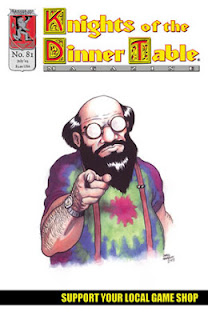I think a lot of folks have had enough with Kickstarter, even though it is going strong. I think they've jumped the shark and it is only a matter of time before things implode over there. Don't get me wrong, it is a great idea and it really fills a hole for young start-ups, but established companies are quickly turning it into a method to pre-sell products and cut out middlemen in the distribution chain.
Steve Jackson Games put up an Ogre Kickstarter to raise $20K. Actually that isn't really accurate as they put up the Kickstarter to pre-sell 3,000 copies of Ogre. They've gotten 4973 pre-orders so far, but that was with some quick math. Some folks are getting multiple copies so let's make it an even 5,000 orders.
Gee Chris, that sounds like a good deal...why does this bother you?
 The thing is, Steve Jackson Games doesn't exist in a vacuum. They make the bulk of their money from other people....other companies. Their products are sold in retail locations throughout the country and internationally. Distributors buy their products and ship them to their retail customers who then sell the games to the final consumer. There is an entire infrastructure that has been created to support publishers like Steve Jackson Games.
The thing is, Steve Jackson Games doesn't exist in a vacuum. They make the bulk of their money from other people....other companies. Their products are sold in retail locations throughout the country and internationally. Distributors buy their products and ship them to their retail customers who then sell the games to the final consumer. There is an entire infrastructure that has been created to support publishers like Steve Jackson Games.....and now he is shitting all over them.
When you look at the numbers it seems evident that Ogre is NOT a "low margin game". Sure, it may be lower margin compared to some other products, but margin and the increased costs all along the value chain are generally factored into the final price of the product. Generally speaking, when you call something a $100 game, that is what you'd expect to find it for in the store. That $100 pays everyone along the line, and everyone earns that money and pays it up-front before the customer buys the game.
I won't pretend to know the appropriate figures, although I do have a fair amount of retail experience and may be able to guesstimate parts of the value chain, but let's just go with some rough numbers and use the following, generally safe, assumption: the parts of the sales and distribution chain with the most risk generally make the most amount of money.
The publisher has to produce the game and get it made. On a $100 game they get $40 and on a good day make $15.
The distributor gets $20 and for that money they have to buy the game in bulk from the publisher, advertise it, and push it out to the retail stores. Since the distributors don't make a lot of money and they have expenses (advertising, shipping, carrying costs) they generally try to solicit pre-orders and buy just what they need to satisfy their customers. The distributors generally have the largest expenses of anyone in the chain as they generally have the most employees, the largest facilities, and the most money tied up in product.
The retail store gets $40 from that game, but they have the biggest amount of risk because they are actually purchasing the game from the distributor. The longer it sits on their shelf the more the game costs them. If they could get away with only handling pre-paid pre-orders then they would get the most bang for their buck. Any sales or discounts come out of their pocket and on that $40 markup they hope to make $15.
What companies like Steve Jackson Games are doing is cutting out the middlemen, taking that share of the profits, but without the risks. Now instead of getting $40 and maybe making $15, they are getting $100 and maybe making $75. Sure, they are sharing some of their extra profit with the end consumer via extra goodies for Kickstarters, but in the end they are essentially taking money out of the pockets of the people who help them make them money on all their other products.
....and they are doing this all without risk. The risk/reward ratio is almost non-existent. All they have to do is establish the parameters to where they make a metric butt-load of cash or the deal doesn't go through.
I cannot speak for anyone else, but when I see people screwing over those that helped get them where they are today in order to make a few extra bucks....that just isn't right.
Kickstarter should be used to help fund new start-up projects, not to let fat cats get fatter.
Support Your Favorite Local Game Store (FLGS!), and please use Kickstarter responsibly!




No comments:
Post a Comment